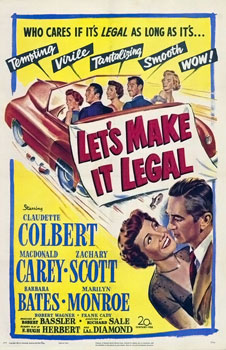In The
“Golden Age Of America” Night-Claudette Colbert’s Let’s Make It Legal
DVD Review
By Zack
James
Let’s Make
It Legal, starring Claudette Colbert, MacDonald Carey, Zachary Scott, 1951
There has
been a lot of reflection lately in the media, on the political stump and around
the water cooler by those older generations, the dwindling number of Great
Depression and World War II survivors and their progeny, the Generation of ’68
about the 1950s “golden age of America,” they passed through when it looked
like all boats, or a lot of them were rising. When working people had a shot at
a few of the goods of life and American military might if not unchallenged
could hold its own. The age when common cultural artifacts were the stable two
parent family, the dream of owning one’s own house, and no troubled waters.
This social vision exemplified by the television fare with its very stable (and
wise) Ozzie and Harriet, Father Knows
Best, and The Donna Reed Show.
All taking a light-hearted look at the foibles of the modern American family.
The film under review, Let’s Make It
Legal, although light-hearted enough for the golden age veers off that
standard a bit.
The subject:
the last throes of a divorce agreement between one long-suffering wife, played
by Claudette Colbert, and one stray cat gambler husband causing that
long-suffering, played by MacDonald Carey. (No hint of any hanky-panky on his
part with the ladies even though Marilyn Monroe has a small part here just the
gambling and hanging with the guys so maybe wifey was right to give the guy the
boot, the boor.) The starling thing to my mind whatever humor was involved in
the story line was the devil may care attitude toward divorce in the film. Not
very Ozzie and Harriet-like but also not very
much like my growing up neighborhood where the lone divorced woman (and
her child, my friend Gary) was looked upon as not quite right, not quite
fitting in with the ethos of the neighborhood even though he ex-husband was
something like the town drunk.
But enough
of that. Let’s run through the thin gruel plot. So husband and wife are
breaking up the household after twenty something years of marriage due his
excessive gambling (although breaking up the household may be too strong a word
since he was hovering around the house, which she got in the settlement, more
than my hard-working not divorced father ever did but we will let that slide).
Problem: their only child, their daughter, their adult daughter with a husband
and child is crazy to see them get back together. (The daughter, hubby and
child residing in the house with mother something not unusual for
twenty-somethings these days but against the norm in the generation-separating
1950s where the young were dying to get out on their own). For most of the film
she is unsuccessful in that attempt despite her best plans and despite father’s
desire to get back into mother’s (and a grandmother to boot) good graces.
To add fuel
to the fire an old flame of the wife’s, played by Zachary Scott, now a rich
eligible bachelor shows up and wants to reignite the flame. That goes on for a
bit, a long bit and she almost succumbs but that bachelor has been a bachelor
too long, is too set on a big governmental career appointment and so back she
goes to her ex. Some funny lines here but I am still scratching my head over
the poor treatment of my poor friend’s mother who was seen in the neighborhood
like some fallen woman and not as just a sensible woman. Go figure.

No comments:
Post a Comment